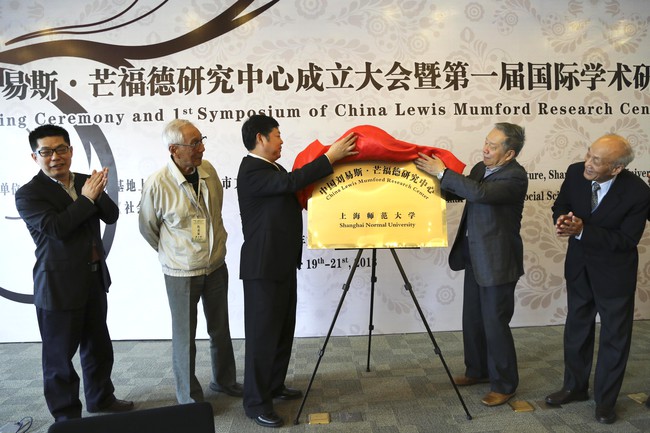
Amid China’s frenzied urban development, what would Mumford do? Lewis Mumford, the 20th-century urbanist and polymath whose seminal book The City in History argued for the organic growth of cities, might seem irrelevant to the contemporary study of top-down planning in China. The leaders of the newly established China Lewis Mumford Research Center think otherwise.
Song Junling, who has translated Mumford’s writings into Chinese since 1982 and was instrumental in establishing the center, said its purpose is to conduct seminars, promote research, and teach students about Mumford. The center opened at Shanghai Normal University on October 19 with a ceremony and symposium, which began with a presentation titled “What Can We Learn from Lewis Mumford Today?” Thirteen talks followed on topics including the fragmentation of Shanghai’s historic plan, Mumford’s idea of the megamachine, the determining features of ancient Chinese cities, and current Chinese literature on Mumford. Academics with backgrounds ranging from philosophy to archaeology participated, reflecting Mumford’s widespread influence.
Discussing Mumford in Shanghai may seem a stranger-than-fiction agenda. Yet the participants think that early-21st-century China faces similar issues to those in Mumford’s mid-20th-century America: traffic, sprawl, pollution, health, economic disparity, prioritization of technology, and more. His promotion of regional planning, critique of new towns built without historical context, call for including green spaces within cities, and advocation of low-rise building over skyscrapers make sense in contemporary China, they said.
Time will tell what effect the center will have on urbanism in Shanghai and beyond. Song says Shanghai Normal University was chosen for the Mumford Center because, after his 18-year search for its home, the university was a receptive participant. Yet as a liberal arts university without a planning department, it might not have the import it could. Asked if the center’s work is meant to go beyond the academy and address the urban planners and developers who shape China’s cities, Song recalls a Chinese saying: each firefly gives off a bit of light; when many fireflies gather together they can produce a lot of light. The populist tale would likely sit well with Mumford.
